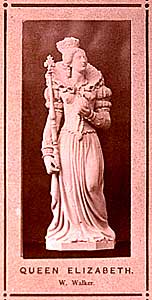 |
Queen Elizabeth
Found on the north facade of the Scott Monument.
Queen Elizabeth (from the novel 'Kenilworth', 1821) is shown in
typical regal fashion in a long gown, with a large ruff around her
neck, and a crown on her head. She is holding a globe in one hand
and the sceptre of state is supported by the other.
Scott wrote that, having had "a certain degree of success"
in delineating Mary Queen of Scots in The Abbot, he was naturally
induced "to attempt something similar respecting 'her sister
and her foe', the celebrated Elizabeth".
He drew Elizabeth as:
"at once a high-minded sovereign, and a female of
passionate feelings, hesitating betwixt the sense of her rank and
the duty she owed her subjects on the one hand, and on the other
her attachment to a nobleman [Leicester], who, in external qualifications
at least, amply merited her favour."
She was "fond of governing by factions, so as to balance two
opposing interests, and reserve in her own hand the power of making
either predominate… To finesse - to hold the cards - to bridle
him who thought himself highest in her esteem… were arts which
she used throughout her reign".
"Her subjects had the full benefit of her virtues, which
far predominated over her weaknesses; but her courtiers. and those
about her person, had often to sustain sudden and embarrassing
turns of caprice, and the sallies of a temper which was both wild
and despotic".
About the Sculptor
William Walker (1791 to 1867)
Walker was born in Musselburgh in 1791 and died in London on 7
September 1867. He studied in Edinburgh under James Mitchell and
went to London in 1816 to study stipple engraving under T. Woolnoth.
On his return to Scotland in 1819, he produced some fine stipple
engravings after Sir Henry Raeburn, including ‘Sir Walter
Scott’.
Walker also engraved the well known plate of ‘Robert Burns’
after Naysmyth. His other plates include ‘The passing of the
Reform Bill’, ‘The Aberdeen Cabinet’, (1857),
and ‘Distinguished Men of Sciences living in Great Britain’
(1807).
^ back to the top |



